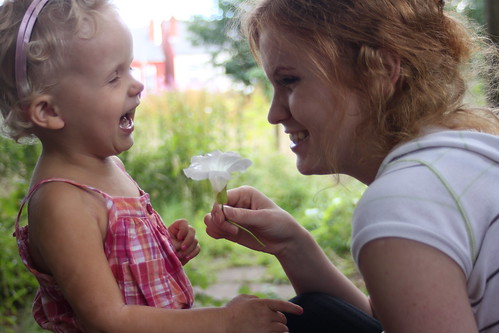|
"But if we move, how can I see my friends?" "That's a really long way away from Granny's house. When do I get to see her?" These are some of the questions kids may ask when moving. They will likely be dealing with many difficult transitions. As a parent who has dealt with this type of scenario more than once, here are some of my best positive parenting methods for helping kids transition during a move.
Be quiet and listen. Before explaining a multitude of things about your move, listen to how your child is feeling. Take him for a walk or relax in the backyard and just let him say what he feels. Sometimes just letting everything out, knowing someone hears you, is helpful. This also gives you some insight into what is needed to help him feel better. It's easier for kids to transition when they know they are heard and that their concerns matter. Find solutions for keeping in touch with friends and relatives. If you're only moving across town, it should still be relatively easy to keep up with friends and relatives that once lived nearby. But if your child will need to leave them in another state or country, alternative solutions will be needed. Email, Facebook, a cell phone, or messenger apps are just some of the ways to keep in touch. Be creative and figure out what works for your child, depending on age and preferences. It's easier to transition to a move when familiar people aren't out of reach. Be sure the child knows the reasons for moving. Even if they don't express it, children might feel like a move is their fault. This can especially be true if the move is due to divorce or similar situations. Make the transition more smooth by explaining to your children the reasons for the move. Make sure they know that the move is not their fault. Remain positive about the move. Regardless of the reason for moving, keep it positive. Represent the good aspects of moving to your child. It's alright to discuss some of the things the family doesn't like about moving. But don't forget to also talk about the good things. Are you closer to a nice, new school? Closer to family? Maybe there is an area attraction the kids would enjoy. It's easier to transition when the good things about it are made obvious. Be understanding. Sometimes no matter what you say or do, a child is going to be unhappy about the move, at least at first. Lend an ear and an open mind and heart. Even if it isn't possible to go back to the way things were before, your child needs to know that you understand his feelings. You can tell him your concerns as well and how you are dealing with them. You can also just be a shoulder and source of comfort. In time, your child will very likely transition to the move and before you know it, he'll have new friends to hang out with. The important thing is that you be there for him until he does. *I originally published a version of this via Yahoo Contributor Network
0 Comments
Positive Parenting Tips: How to Show Kids They Matter
For whatever reason, kids can often feel as though they are the odd one out - that no one understands them. You know full well that your kids matter. Show them just how much with some positive parenting. Most parents do care and want their kids to know that, but some just aren't sure how to put feelings into action.
Give them choices. Although you may want everything to go a certain way, kids should be a part of family decisions, too. Sometimes - maybe many times - not everyone is going to agree on things. Let the kids decide what to do whenever possible. This shows them their thoughts matter to you. When kids know they matter, they may be more inclined to respect your wishes for decisions you must make. Respect their opinions. Even when their opinions differ from yours - and they will sometimes - respect what your kids think. Things don't always have to go their way. But let them be individuals. Sooner or later your child is going to grow up. He needs to know his voice matters to be respected in the world outside your home. Even inside the home, your child's opinions and insight should count. Give them freedom. There are limits to this for safety reasons, of course. But give your kids some freedom. They don't need to be right next to you at every moment. Trust them to do age-appropriate tasks without your assistance. It can be a parental instinct to be a mother hen or a father lion. That's part of being a parent, but if we don't let them do some things for themselves, they will never learn. Let them teach you about their favorite things. You may be old and wise, but kids have so much to teach us adults. Listen. Let your child know that her interests are important to you. Sometimes what kids are interested in don't line up with those of their parents. Still, you need to be supportive of your child's individuality. Don't try to force your interests on him and don't attempt to keep him from his unless they are harmful in nature. Show affection even when they misbehave. Even when kids misbehave, they still deserve your love. Discipline must take place. But that doesn't mean a hug isn't in order. In fact, that may be exactly what the doctor has ordered. Show your child his feelings matter to you by still showing affection, even in difficult times. *I originally published this via Yahoo Contributor Network Positive Parenting Tips: Keeping Kids Motivated Positive parenting is about looking for results that have a lasting positive effect on your child. Keeping a child motivated can sometimes be difficult. This is especially true when they start seeing evidence that not all things will work out as planned. As a parent, your job is to keep them motivated and inspired to do good things even when the outlook doesn't seem to match what they want.
Keep a goal chart. Make a goal chart so that kids can keep track of their goals, dreams, and accomplishments. These can be a good mix between small and large goals. Blending them together helps kids see that some things can be accomplished quickly and easily, while others may take more time and effort. If you only track large goals, that could discourage some kids when they see how long it's taking. On the flip side, if you only track smaller, simple goals, they may think everything in life is easy, which could backfire when there are certain things they cannot have or do right away. Cheer them on. When watching your kids achieve goals, milestones, and achievements, don't forget to cheer them on. This is true with the items on the chart and just everyday achievements. It can be easy to just shirk off the simple things after a child tells you about the same or similar things every day. But, if your child is excited about something, big or small, cheer her on anyway. Don't dwell on failures. It's only natural that your child will not succeed at everything. Don't focus on these things. It's alright to offer encouragement for your child to try again. But don't focus overly on the negative aspects of failure. Instead, find the positive things that occurred in the process of trying to obtain goals. Let them know they motivate you. Most parents get inspired by their kids often. But how often do we let them know how they make us feel? We might tell them we love them. But when your kids inspire you to do something, do you tell them you are doing it because of them? Doing so lets them know they have the ability to do great things. Foster what excites them. Does your child get especially excited over something in particular? Harbor that interest. If it's dance, get him in dance classes and offer gentle - not pushy - encouragement and guidance. If it's medicine, take her to medical museums, buy books, and register her for age-appropriate classes. Fostering and encouraging their natural interests, without pushing them or expecting too much, helps children develop self-confidence. This motivates them to be the best they can be as individuals. *I originally published this via Yahoo Contributor Network Positive Parenting: Why Doesn't My Teen Trust Me? As a veteran parent, I often get asked questions about raising children. Teenage years seem to be the toughest for many parents. This is in part due to the fact that kids start becoming independent. One question people ask often is "Why doesn't my teen trust me?" Is the parent at fault when teenagers don't trust them? Is there a deeper reason or is this just a part of the transition into adulthood?
Does your teen have reason not to trust you? Take a look at how you interact with your teen. Do you break promises to him? Do you do more talking than listening? Perhaps your teen is afraid you will want him to do things just like you and his beliefs differ from yours. Examine your relationship to see what you can do to build upon trust. It is not always the parent's fault when this happens. There also may be a simpler explanation. But don't automatically assume the problem can't lie with you. Your teen may simply be looking for a friend, not a parent. Let her trust in her friends rather than you when she needs to. It is not necessary for her to tell you everything about her life. While it is hard to realize that our children are growing up, we need to give them their own space. Just because she isn't trusting in you, does not mean you are a bad parent. She may simply need a close friend to lean on. This is perfectly healthy and normal. Listen, but don't talk. Sometimes a teen just wants to vent. Don't analyze the situation. Just sit there and hear what she has to say. It can be difficult to listen without trying to solve the problem. But be confident in your parenting skills. Ask questions instead of providing solutions. Your teen can and should think for himself. This not only helps him learn to trust you, but also teaches invaluable problem-solving skills. You can offer advice later. But when your teen is opening up, it is best to be minimal with your words and let her express her concerns. Discuss issues you faced as a teen. This is one of the most important things you can do for your child. While you may not think so, teens do listen to their parents. They may protest and say things like "It was different when you were a kid, Mom" or "You don't understand!" But trust me, they hear you. When difficult situations arise, they will think back to many of the things you have discussed over the years. Remember those days when your parents gave you advice? You may not have been too happy to hear it. But chances are, you have applied some or all of it over the years. Give your teen the chance to make her own decisions and learn from doing, just like you did. Keep a parent to child journal. A journal where you each write notes to each other can help bring you closer together. When your teen is frustrated, it may be easier to write things out on paper than tell you to your face. You can write back after reading each note written to you. That way, your teen can read the responses when she is more comfortable. The journal can be used both for fun and lighthearted discussions, as well as more serious ones. Some trust issues may be cause for deeper concern, such as bullying, mental health issues, and more. This article is for informational purposes only and is not meant to diagnose or treat any conditions. Always seek appropriately licensed health care specialists for advice specific to your child. *I originally published this via Yahoo Contributor Network Positive Parenting: Encouraging Educational Responsibility in Kids Many times successes and failures in school can be traced to educational responsibility. Is your child in charge of his success – or failure when it comes to learning? If you find yourself helping too much or taking the blame for his achievements (or lack thereof), you may not be giving your child enough educational responsibility. Provide access to a variety of study materials. When children have ready access to books and other educational materials, it's easier for them to become naturally in tune to learning. You don't have to spend large sums of money if you don't have it, but try to have things around that are helpful to their education. Manipulatives, educational videos, and hands-on science kits are great tools, in addition to books. Some libraries will loan out these items if you cannot afford to purchase them or would just prefer to be able to return them when finished. Never do their work for them. When your child is seemingly having a nervous breakdown, it's easy for some to just give the answers. Do not do this. Instead, give your child some time to calm down and encourage him to try again. You can help for explanation purposes. But allow the child to complete the work on his own. Educational responsibility is easier to come by when it is a natural habit in the household. Incorporate independent study. In addition to any homework, kids need to study things on their own as well. This could be additional information for what they are working on in required studies. But it may also be a free topic the child is interested in. Encourage your kids to learn new things, be it the history of a fad or more knowledge in required subjects. You may need to make the suggestion or first steps. But in time you will see your child start to automatically do this on his own. The desire for independent study is a good sign your child has some educational responsibility.
Allow room for mistakes. Remember that your child is not perfect. Remind him of this as well. Mistakes are okay. They give him a chance to learn and grow, and are a huge part of educational responsibility. When kids can recognize when they are wrong and need some extra work, this is a sign of responsibility. Let them discover those things within themselves. Encourage your child's interests. When your child has an interest in something, encourage him by providing study materials for that subject. Take him on field trips or play games related to the interest. If your child wants to be a fireman, take him to a firehouse. If she wants to be a doctor, take a hospital tour and buy medical books at her comprehension level. Whatever your child is interested in, encourage (without forcing) him to learn more about it. Let your child tell you what he learns and also what he already knows as well. Let them take responsibility for accomplishments and mistakes. When your child fails a test, do you blame yourself for not pushing him or do you point out to your child what he may have done to receive better results? The answer should be the latter, but many parents will take the blame for the mistakes of their kids, which can lead to them being irresponsible. Do not force learning or use education as a punishment. Never say to your child things like “If you don't clean your room, I'm going to make you do algebra!” This teaches the child education is a bad thing. She is not going to be responsible when it comes to learning if her thoughts about it are negative. Always make learning a positive experience and offer it freely, rather than forcing the child to participate. *I originally published this via Yahoo Contributor Network |
Instant Download On Order
Categories
All
Archives
May 2024
|
- Brand Shamans
- Brand Healing
- Inner Healing
-
INTENT-SIVE NATURE
- Content & Brand Elevation
- Healing Jewelry & Talismans
- Bath, Beauty, & Self-Care
- Healing Sessions
- Rituals, Herbs, & Altar Supplies
- Gawwwdess Baby Boutique
- Soul Flame Gifts
- Yoga & Meditation
- Books & Media
- Education & Homeschool Resources
- Home, RV, & Decor
- Clothing
- Pets
- Custom Orders
- Monthly Subscription Boxes
- October Festivals
- FLOW-Key Parenting
- About & Contact
- RV, Nature, & Travel Shamans
- Souls Within
- Life & Home
- Heart 'N Mind Homeschool
- The Homeschooling Mommy
- Books & Authors
- Speak Up!
- Pawsitive Pet Parenting
- Manifesterz
- Gifts In Minutes
- Brand Shamans
- Brand Healing
- Inner Healing
-
INTENT-SIVE NATURE
- Content & Brand Elevation
- Healing Jewelry & Talismans
- Bath, Beauty, & Self-Care
- Healing Sessions
- Rituals, Herbs, & Altar Supplies
- Gawwwdess Baby Boutique
- Soul Flame Gifts
- Yoga & Meditation
- Books & Media
- Education & Homeschool Resources
- Home, RV, & Decor
- Clothing
- Pets
- Custom Orders
- Monthly Subscription Boxes
- October Festivals
- FLOW-Key Parenting
- About & Contact
- RV, Nature, & Travel Shamans
- Souls Within
- Life & Home
- Heart 'N Mind Homeschool
- The Homeschooling Mommy
- Books & Authors
- Speak Up!
- Pawsitive Pet Parenting
- Manifesterz
- Gifts In Minutes






 RSS Feed
RSS Feed





